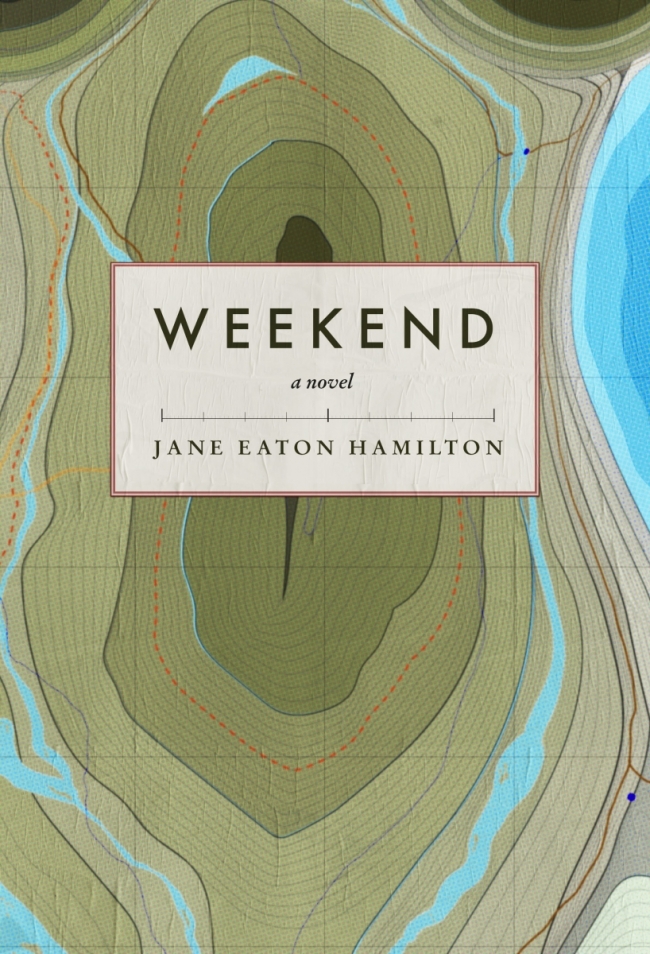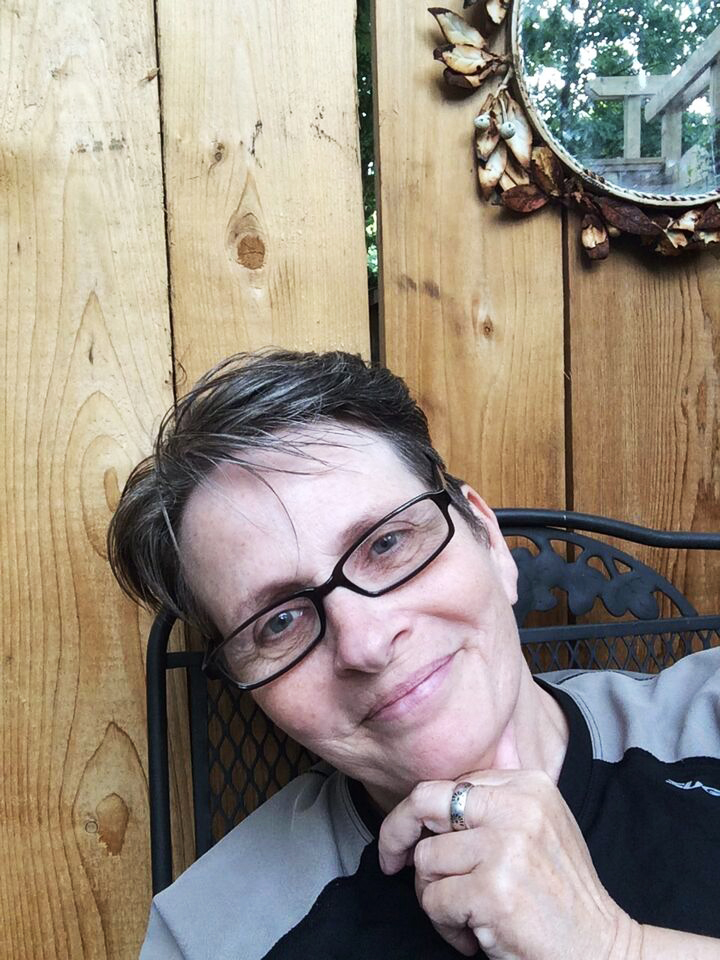
"I just wanted to write a silly little romance," says Jane Eaton Hamilton on the phone from Canada, about her new novel, Weekend. Hamilton accomplished that, if you consider a riveting, frank, nuanced exploration of adult sexuality and love silly or minor. A tale of two couples -- all female, but not all identifying as such -- whose relationships come into focus over an intense few days, the novel sends new lovers to an island owned by someone with whom each has a tricky history -- at which point their host's own happy life begins revealing troubling undercurrents. Weekend wears its gender, racial, and economic politics lightly. Yet the intelligence of Hamilton's observations and the spare beauty of her language elevate highly specific dynamics into a work that crosses all boundaries.
After having amassed a body of incisive essays, nine books of award-winning short stories and poetry, and a memoir about having children with a man who turned out to be a pedophile rapist, the Canada native is starting a new chapter of sorts with Weekend. "I actually quit writing in 2003 because of lousy reception," she says. "And then my marriage broke up in 2011 unexpectedly." She decided to give writing another shot. "Although I mourn the work I didn't write during those years, I came back to it so invigorated and refreshed that it's like an entirely different career."
Publishers Weekly called Weekend a "bottle narrative" -- which "turns out to be basically a book that [has] people stuck in a very small place with tensions rising," Hamilton learned. "I tend to be that kind of writer, because I don't have a large world around me." Disabled since age 31, she weaves issues of mortality and serious health challenges through her work matter-of-factly yet somehow suspensefully. "I'm actually a writer who tends to make a lot up from whole cloth," she says when asked how much is inspired by real life -- a writer's least favorite question -- "but everything's informed by my experiences as a queer disabled writer."
Exploring characters on diverse points of the gender spectrum, Weekend exposes provocative truths about violence and power dynamics in sexual relationships, but its author was not seeking controversy: "I think it's just the world I live in. I wasn't setting out to push any buttons! It's just around me everywhere." She considers herself "trans" -- well, "genderqueer," she amends wryly: "It's a little less to answer for." One of her award-winning stories, "Smiley," reflects her "actual adolescent experience of binding my breasts. At 61, I'm still dealing with the same thing I was dealing with at 13 -- I guess non-dealing with." Do we change that much from the person we were at 13? "I don't think we do, really."
If years of discouragement made it hard to continue pursuing writing, Weekend was a fairly easy journey, ironic for a story brimming with Drama. From manuscript to published book took all of seven months --"and it needs more work," mentions Hamilton, classic writer. I share a memory of a reading at which novelist Barbara Kingsolver was asked how she knew when a book was finished. "When my editor pries the manuscript from my clenched fingers," Kingsolver said. Hamilton laughs at the story: "Exactly. I would never stop."
Wanting to be part of the community published by Arsenal Pulp, "this amazing press who has been doing queer books forever and ever, publishing a lot of works that I've loved," Hamilton whipped off a story of one relationship in a month, and sent it to the publisher. "We can't publish a 30,000 word book," she was told. "You can use large font," she suggested. "I had no idea how to expand it," she recalls. "I just put another couple on the island with them -- I don't really know where that couple came from, except that I was on an island, and I was with my daughter, who had just had a newborn." New motherhood ups the ante in Weekend, informed by "how your moods are just all over the place."
Some might feel exposed having extremely intimate sexual and psychological details in print, but Hamilton doesn't flinch from unearthing the core of taboo interactions. Her characters have the complexity and humanity to make their stories compelling even to those of us for whom sex is not primarily motored by violence or the exercise of power.
Does Hamilton, mother of two daughters, have any anxiety about her children (and grandchildren!) reading Weekend? "Oh goodness, no. They grew up in this world." Her oldest daughter, a lawyer whose newborn provided the inspiration for the book's maternal subplot, worked at Little Sister's, the bookstore famous for a censorship case that was taken through the courts, during the very period it was repeatedly threatened and bombed. "My kids both happen to be heterosexual, but they're absolutely open people," says Hamilton.

A devotion to championing diversity was likely inherited from a mother determined to seek justice, even if it meant suing the government. One of 36 litigants in Canada's landmark same-sex-marriage case, Hamilton joined the couples leading the fight in 2000. "We were out there alone, because nobody'd ever done this before." This past winter she realized how remarkable the experience had been while playing a "human library book" for Canada's Fringe festival. "I mostly was being talked to by 18-, 19-, 20-year olds. A lot of them were immigrants and had no idea how that had come to pass in Canada. It was fascinating. Fascinating!" The "excellent archives" Hamilton kept can now be found in Toronto's Lesbian and Gay Archives, for those curious to learn more -- or, say, research a book on the subject.
One thing that surprised Hamilton about the case? How "the Vancouver queer community turned against us," upholding the fine gay tradition of infighting and eating our own in a way she recalls as "extremely painful for the litigants." At the time, then editor of former local gay rag Xtra West Gareth Kirkby came out against the gay couples: "He said he hoped that we lost, and then he ran an article against us every single issue for the entire case. Then when we won, he went and got married." Hamilton laughs. Though her hard-won marriage would ultimately break up, the similar fate of one of Weekend's couples caught their creator off guard. "I'm one of those innocent writers who just plunges ahead and sees what happens. I had no idea." Still, as someone who "did get left unexpectedly," she notes that "those sort of large, not very nice acts happen all the time -- sort of out of the blue for the other spouse."
Weekend's fraught dynamics include rich versus poor, white versus black, strong versus imperiled, female versus "other," S versus M. Readers may take some adjusting to the pronoun "they" for a trans character, and the author does not initially reveal the race of another, which means we come to know her before amassing any preconceptions -- but again the tactic was not premeditated. "I'm face-blind, so describing characters is not something I really think of to do," says Hamilton. In a society where everything can be a trigger warning, she honors how complicated humans, and their sexuality, can be. Her glimpse into these lives, including a late appearance of a trans character's mother that conveys their entire relationship in a few strokes, makes one hungry for a continuation of the story, or perhaps a prequel to these unique characters' current existence.
Readers may have to forgo the pleasure: The author is "getting very close" to finishing Snow, a literary novel set in a Japanese-Canadian internment camp during the war, which she expanded from "The Lost Boy," another prize-winning story. "I call it a novel about the avalanche of love," says Hamilton, this time "between a mom and a child, a 13-year-old girl."
Arsenal Pulp's reach extends to the U.S., so readers of all stripes will be able to discover a potent, original voice with Weekend. "I lived in the U.S. for four years, in St. Louis and Phoenix and New York, when I was a new adult. I've lived in Alberta, I grew up in Ontario -- I like to say I've lived in the Bahamas, but it's not really true. My heart lives in the Bahamas." What stands in the way of her coming back to the U.S., especially to New York, where she would love to read and even stay for half a year? "Reality," she says. "Money."
The disparity between Weekend's wealthy characters and their more economically challenged partners reflects some of Hamilton's own reality: "I was married to a doctor for 20 years. I've always had this sort of dramatically opposed -- diverse -- financial life." She did feel some anxiety about the privilege of some of her characters, she admits. "I think the distances between those people are going to rear their head in not-very-pleasant ways. I don't have good feelings about where [one] relationship is going." Is she denying readers our expected romantic reward? "No, no, they're going to live happily ever after." She laughs. "Well, they're certainly not going to live happily ever after without discussing some issues."
